Donald Trump gets desired Democratic foes, but Joe Biden worries linger
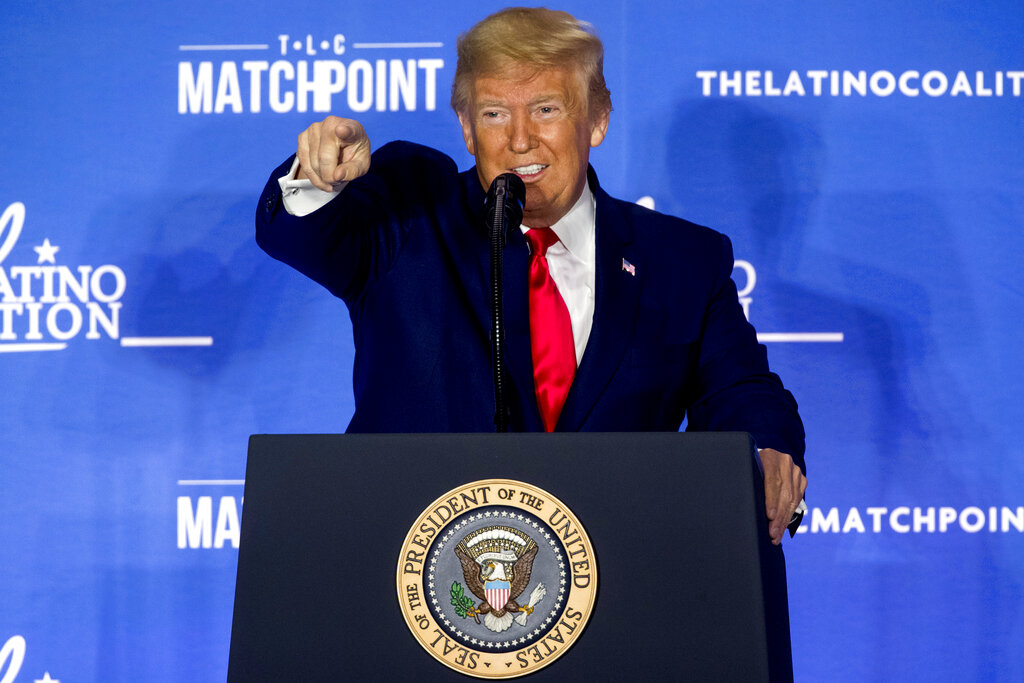
Joe Biden remains the main focus of Donald Trump’s campaign.
Man: Slashing ‘Baby Donald Trump’ was matter of good versus evil

An Alabama man charged with criminal mischief in the slashing of a towering “Baby Trump” balloon has defended his actions, saying it was a matter of good versus evil. Al.com reports Hoyt Deau Hutchinson called the syndicated radio show “Rick & Bubba Show” on Monday to describe what happened. Hutchinson said he was shaking in anger when he drove past the balloon and its handlers Saturday during President Donald Trump’s visit to see Louisiana State play against the University of Alabama. He yelled at the protesters, but then realized they might have seen him, so he bought a University of Alabama shirt to better blend into the crowd and get close to the balloon, he said. Pretending he wanted a picture with the balloon, Hutchinson said he used a material cutter with a sharp razor to slice the symbol open. The orange, diaper-clad caricature of the president is often floated at Trump appearances to protest and mock the president, which the balloon shows clutching a cellphone. The balloon measures over 20 feet (6.1 meters) tall and was left with an 8-foot-long (2.4-meter-long) gash in its backside. “I get so mad about people not taking a stand,” he said. “The left wants to use religion against you like you shouldn’t act like this and stuff but I’ll tell you this — the Devil knows the Bible as good as we do.” Asked if the slashing was Hutchinson’s attempt to echo the Biblical story of Jesus turning over the temple tables of money changers, he said yes. “It comes a point when you gotta take a stand. We don’t have two parties anymore. We have good versus evil. When you got one party that says it’s OK to kill babies and by the way, this is the first time I’m ever seen a liberal get mad about chopping up a baby.” He said he yelled “Trump 2020” as he was being arrested. He later posted bail and was released. When asked about his motivations, the 32-year-old Hutchinson told the radio station he keeps up with politics by watching Fox News and his two favorite anchors, Tucker Carlson and Sean Hannity. “I’m not young but I’m not old. I’m sort of middle aged. I feel like a lot of people my age don’t keep up with the news and politics the way they should,” he said. Information from: The Birmingham News, https://www.al.com/birminghamnews. Republished with the permission of the Associated Press.
Budget deal allows far less money than Donald Trump wanted for wall

Congressional negotiators reached agreement to prevent a government shutdown and finance construction of new barriers along the U.S.-Mexico border, overcoming a late-stage hang-up over immigration enforcement issues that had threatened to scuttle the talks. Republicans were desperate to avoid another bruising shutdown. They tentatively agreed Monday night to far less money for President Donald Trump’s border wall than the White House’s $5.7 billion wish list, settling for a figure of nearly $1.4 billion, according to congressional aides. The funding measure is through the fiscal year, which ends on Sept. 30. It’s not clear whether Trump will support the deal, although GOP negotiators said they were hopeful. The agreement means 55 miles (88 kilometers) of new fencing — constructed through existing designs such as metal slats instead of a concrete wall — but far less than the 215 miles (345 kilometers) the White House demanded in December. The fencing would be built in the Rio Grande Valley in Texas. “With the government being shut down, the specter of another shutdown this close, what brought us back together I thought tonight was we didn’t want that to happen” again, said Senate Appropriations Committee Chairman Richard Shelby, Republican-Ala. Details won’t be officially released until Tuesday, but the pact came in time to alleviate any threat of a second partial government shutdown this weekend. Aides revealed the details under condition of anonymity because the agreement is tentative. “Our staffs are just working out the details,” said House Appropriations Committee Chairwoman Nita Lowey, Democrat-N.Y. The pact also includes increases for new technologies such as advanced screening at border entry points, humanitarian aid sought by Democrats, and additional customs officers. This weekend, Shelby pulled the plug on the talks over Democratic demands to limit immigrant detentions by federal authorities, frustrating some of his fellow negotiators, but Democrats yielded ground on that issue in a fresh round of talks on Monday. Asked if Trump would back the deal, Shelby said: “We believe from our dealings with them and the latitude they’ve given us, they will support it. We certainly hope so.” But Fox News Channel’s Sean Hannity, a Trump ally, said the barrier money in the agreement was inadequate. He warned late Monday that “any Republican that supports this garbage compromise, you will have to explain.” Trump traveled to El Paso, Texas, for a campaign-style rally Monday night focused on immigration and border issues. He has been adamant that Congress approve money for a wall along the Mexican border, though he no longer repeats his 2016 mantra that Mexico will pay for it, and he took to the stage as lawmakers back in Washington were announcing their breakthrough. “They said that progress is being made with this committee,” Trump told his audience, referring to the congressional bargainers. “Just so you know, we’re building the wall anyway.” Democrats carried more leverage into the talks after besting Trump on the 35-day shutdown but showed flexibility in hopes on winning Trump’s signature. After yielding on border barriers, Democrats focused on reducing funding for detention beds to curb what they see as unnecessarily harsh enforcement by Immigration and Customs Enforcement, or ICE. The agreement yielded curbed funding, overall, for ICE detention beds, which Democrats promised would mean the agency would hold fewer detainees than the roughly 49,000 detainees held on Feb. 10, the most recent date for which figures were available. Democrats claimed the number of beds would be ratcheted down to 40,520. But a proposal to cap at 16,500 the number of detainees caught in areas away from the border — a limit Democrats say was aimed at preventing overreach by the agency — ran into its own Republican wall. Democrats dropped the demand in the Monday round of talks, and the mood in the Capitol improved markedly. Trump met Monday afternoon with top advisers in the Oval Office to discuss the negotiations. He softened his rhetoric on the wall but ratcheted it up when alluding to the detention beds issue. “We can call it anything. We’ll call it barriers, we’ll call it whatever they want,” Trump said. “But now it turns out not only don’t they want to give us money for a wall, they don’t want to give us the space to detain murderers, criminals, drug dealers, human smugglers.” The recent shutdown left more than 800,000 government workers without paychecks, forced postponement of the State of the Union address and sent Trump’s poll numbers tumbling. As support in his own party began to splinter, Trump surrendered after the shutdown hit 35 days, agreeing to the current temporary reopening without getting money for the wall. The president’s supporters have suggested that Trump could use executive powers to divert money from the federal budget for wall construction, though he could face challenges in Congress or the courts. The negotiations hit a rough patch Sunday amid a dispute over curbing ICE, the federal agency that Republicans see as an emblem of tough immigration policies and Democrats accuse of often going too far. According to ICE figures, 66 percent of the nearly 159,000 immigrants it reported detaining last year were previously convicted of crimes. Reflecting the two administration’s differing priorities, in 2016 under President Barack Obama, around 110,000 immigrants were detained and 86 percent had criminal records. Few convictions that immigrants detained last year had on their records were for violent crimes. The most common were for driving while intoxicated, drugs, previous immigration convictions and traffic offenses. The border debate got most of the attention, but it’s just part of a major spending measure to fund a bevy of Cabinet departments. A collapse of the negotiations would have imperiled another upcoming round of budget talks that are required to prevent steep spending cuts to the Pentagon and domestic agencies. Republished with permission from the Associated Press
On trade policy, Donald Trump is turning GOP orthodoxy on its head

President Donald Trump’s trade policies are turning long-established Republican orthodoxy on its head, marked by tariff fights and now $12 billion in farm aid that represents the type of government intervention GOP voters railed against a decade ago. President George W. Bush increased the number of countries partnering with the United States on free trade agreements from three to 16. President Ronald Reagan signed a landmark trade deal with Canada that was later transformed into the North American Free Trade Agreement (NAFTA) and expanded to include Mexico. Both those Republican presidents also enacted tariffs, but their comments on trade were overwhelmingly positive. “We should beware of the demagogues who are ready to declare a trade war against our friends, weakening our economy, our national security and the entire free world, all while cynically waiving the American flag,” Reagan said in a 1988 radio address. Trump, by comparison, has called NAFTA “the worst trade deal maybe ever signed anywhere,” and his administration has opted to use tariffs as a tool intended to leverage more favorable agreements with virtually every major U.S. trading partner. He shredded the trade agreement the Obama administration tried to work out with Pacific Rim nations that had strong backing from farm groups and chief executives from major U.S. corporations. Republicans also have altered the priority of tackling the national debt, an issue the GOP hammered President Barack Obama on as the country struggled to recover from the 2008 economic crisis. “Our nation is approaching a tipping point,” GOP Rep. Paul Ryan of Wisconsin, now the House speaker, said in January 2011 when the national debt hit $14 trillion. Today, the Congressional Budget Office projects the $21 trillion debt will rise to more than $33 trillion in 10 years. That estimate notes that the tax cut lawmakers passed in December would increase economic output but add $1.8 trillion to the deficit over the coming decade. The GOP’s evolving priorities are not lost on some in the party. Rep. Mark Sanford, R-S.C., who lost a close primary election this year after butting heads with Trump on some issues, said he finds it “perplexingly destructive” for the GOP brand. “It takes a long while to build a brand, but brands can be diminished or destroyed in relatively short order, and I think the administration is destroying bedrock cornerstones to what the party has historically stood for,” Sanford said. “There is no conversation on the debt, deficit and government spending these days. That has been a cornerstone.” Sanford made headlines as South Carolina governor when he said he would reject stimulus money approved during the financial crisis because he did not think the country should go into debt to fund recovery efforts. “Here we are now with a hypothetical $12 billion bailout package and you don’t hear a word,” Sanford said. “That is quite a transition in not so many years from decrying what the Obama administration had done with bailouts to now endorsing the idea of bailouts.” Trump, in a Friday interview on Fox News’ Sean Hannity’s radio show, said the strong economy would help the U.S. reduce the deficit. “The economy, we can go a lot higher. … We have $21 trillion in debt. When this really kicks in we’ll start paying off that debt like water. We’ll start paying that debt down.” The administration’s plan on the bailout announced last week would borrow money from the Treasury to pay producers of soybeans, sorghum, corn, wheat, cotton, dairy and hogs. Many farmers have criticized Trump’s tariffs and the damage done to commodity prices and markets. Some GOP lawmakers are expressing concerns. “I didn’t come up here to start new government programs,” said Sen. John Kennedy, R-La. But it’s unlikely that the Republican-controlled Congress will try to block the administration’s agricultural aid plan. “I’m looking at this and saying, ‘You’re going to single out one sector?’ What about the manufacturing sector? What about the energy sector?” said Sen. Lisa Murkowski, R-Alaska. “Where do you draw the line? I’ve got some real concerns.” But others praised the move. GOP Rep. Mike Conaway of Texas, chairman of the House Agriculture Committee, called it “welcome relief.” “This is the right fight to have, but in the meantime, our producers have got to live as this fight is going on,” Conaway said of a trade dispute with China that has prompted the imposition of tariffs by both nations. Conaway said the president has reshaped the way Republicans think about trade. “He’s kind of changed the narrative of the conversation that it’s really not OK to let other people take advantage of America,” Conaway said. Rep. Dan Kildee, D-Mich., said it’s clear the GOP has changed over the past two years with Trump in office. “This is the party of Trump. He calls the plays and they line up and they execute the play,” Kildee said. But Kildee also opposed the Trans-Pacific Partnership deal that the Obama administration was trying to work out with Japan, Vietnam, Singapore and others. He and many other Democrats described past trade deals such as NAFTA as hurting workers in their home districts. So why the criticism of Trump and the efforts he has undertaken on trade? Kildee said he would prefer a more deliberative approach and a multilateral approach that doesn’t fray longstanding alliances. “Simply engaging on the issue of trade doesn’t mean he’s doing it right,” Kildee said. The president’s meetings with lawmakers in the past week and his trade advisers’ visits to Capitol Hill are acknowledgements that many GOP lawmakers are worried about where Trump is headed — and what it could mean in the November election as farmers, bourbon makers and manufacturers who use imported steel and aluminum deal with the fallout. A possible breakthrough with the European Union announced Wednesday at the White House appears to have eased their concerns and given the president more time to work out new deals. “The fact the EU was here today and good talks happened, I think
Rudy Giuliani becomes aggressive new face of Donald Trump legal team
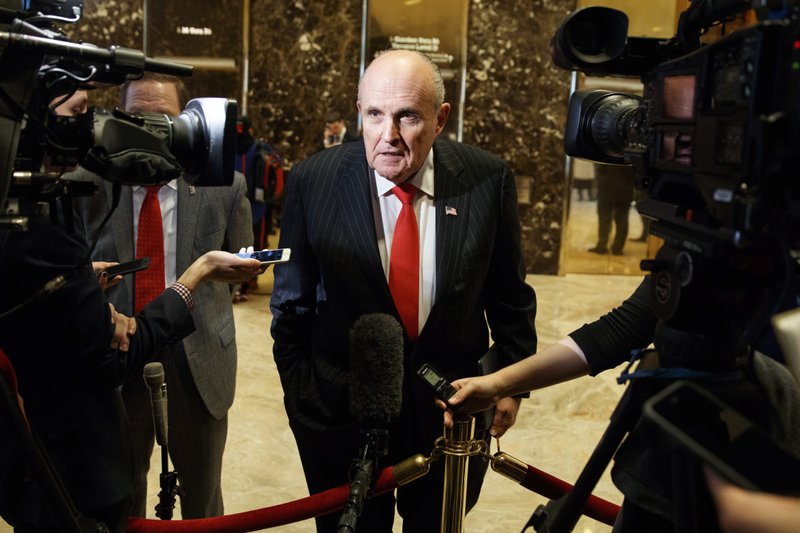
Rudy Giuliani, once known as “America’s Mayor” and hailed for helping unite a wounded city after Sept. 11, has become the aggressive face of President Donald Trump’s forceful new legal team. Giuliani, who is bonded with the president by a particular brand of New York bravado, has escalated Trump’s attacks on the Department of Justice, pushed for strict limits on special counsel Robert Mueller’s Russia probe and upended White House legal strategy. Giuliani and Trump cut out senior West Wing aides this week as they hashed out plans to combat what they see as an existential threat to the presidency. Giuliani’s bold offensive — on display in a series of cable news appearances in which he unleashed broadsides on the very law enforcement officers with whom he once worked — underscored the thoroughness of his transformation from moderate Republican mayor of a liberal city to fiery conservative hero. “Russian collusion is total fake news,” Giuliani, a former U.S. attorney, told Fox News. “Unfortunately, it has become the basis of the investigation. And Mueller owes us a report saying that Russia collusion means nothing, it didn’t happen. That means the whole investigation was totally unnecessary.” Giuliani has quickly become the dominant figure on the president’s reshuffled legal team as Trump stocks his political inner circle with familiar, TV-ready faces. The two have had several private conversations in recent days in which Giuliani fanned Trump’s anger with Mueller’s probe, according to two people familiar with their conversations who spoke on condition of anonymity because they weren’t authorized to publicly discuss them. Giuliani has warned Trump against sitting down for an interview with Mueller and has suggested that, at a minimum, the president place limits on his level of cooperation. Giuliani has warned Trump that he fears that the president’s longtime personal attorney, Michael Cohen, may flip on him. He has urged Trump to cut off communications with Cohen, according to a person close to Giuliani but not authorized to discuss the talks publicly. After an FBI raid on Cohen’s office and home, Giuliani also indicated that he wanted to change the discussion surrounding the $130,000 payment that Cohen made to porn actress Stormy Daniels to buy her silence about a sexual tryst with Trump. Giuliani did so with a jaw-dropping interview with Sean Hannity on Wednesday. Giuliani’s remarks — that Trump knew about the payment and had repaid Cohen for it — seemed to contradict Trump’s past statements. But he argued that it removed legal peril over a possible campaign finance violation, a claim some legal experts have questioned. Trump was pleased with Giuliani’s performance, according to a person familiar with his views but not authorized to speak publicly about private conversations. Over a pair of Fox News interviews, Giuliani also unleashed a series of provocative broadsides. He said Trump had fired James Comey last year because the FBI director wouldn’t publicly clear the president of wrongdoing in the Russia probe, a different explanation than the White House offered. He said he would defend the president’s daughter Ivanka Trump but suggested that her husband, Jared Kushner, was “disposable.” And he derided the agents who raided Cohen’s office as “stormtroopers,” a charge that attracted particular attention because it appeared to evoke Nazi soldiers in the context of the Manhattan U.S. attorney’s office, which had approved the raids and which Giuliani had once led. “It’s a different Rudy. He’s always been tough, but he changed when he started to have national ambitions,” said George Arzt, former press secretary to Democrat Ed Koch, one of Giuliani’s predecessors as New York City mayor. “And after he wedded himself to Trump, his popularity in his hometown disappeared completely.” Giuliani was elected mayor in 1993 on a pledge to slash the city’s sky-high crime rate. That year, 1,946 people were killed in the city. By 2001, Giuliani’s final year in office, the number had shrunk to 649. Giuliani was largely praised for the drop in crime but remained a polarizing figure. His no-holds-barred defense of the New York Police Department, often at the expense of minority communities, drew sharp criticism. A possible Senate run was abandoned after a cancer diagnosis. And after years of public battles and a very messy public separation from his second wife — which resulted in him moving out of Gracie Mansion, the mayor’s official residence — his poll numbers sank and many New Yorkers were eager for a change at City Hall. But then, one clear September day just a few months before he was to leave office, two planes flew into the World Trade Center. In the hours after the attacks, Giuliani became the face of the nation’s grief. His leadership — both inspiring and compassionate — over the following weeks earned him the nickname of “America’s Mayor.” But his relationship with the city would soon change again. Giuliani played a key role in the 2004 Republican National Convention that re-nominated President George W. Bush, a deeply unpopular figure in New York. And Giuliani shifted right on a number of issues — including gun control and public funding of abortions — during his failed presidential run four years later. Although his future electoral prospects vanished, Giuliani remained a conservative darling, a frequent guest on Fox News and a sought-after member of the political speaking circuit. He has known Trump for decades — his bomb-throwing rhetorical style can at times mirror that of the president — and he became an aggressive surrogate for the celebrity businessman from the early days of his insurgent presidential campaign. Giuliani had been widely expected to join Trump’s administration but was passed over for secretary of state, the position he badly wanted, and eventually was left without a Cabinet post. But the president kept in touch with Giuliani, sometimes calling to ask for advice, and frequently asked for the ex-mayor’s take on developments in the special counsel’s probe, according to three people familiar with the conversations but not authorized to publicly discuss private talks. In the weeks
Anxiety grows for Donald Trump after raid on his personal lawyer

President Donald Trump and his allies have hit a new level of anxiety after the raid on his personal attorney’s office, fearful of deeper exposure for Trump, his inner circle and his adult children — and more than concerned that they don’t know exactly what is in those records and electronic devices seized last week. There is also some worry that Michael Cohen, the self-described legal fixer who helped make bad stories go away and took a leading role in Trump Organization projects in foreign outposts, may strike a deal with prosecutors out of concern about his own prospects. “I think it’s a huge minefield for Donald Trump and the Trump Organization,” said trial attorney Joseph Cammarata, who represented Paula Jones in her sexual harassment suit against President Bill Clinton. “I think this is on its own track and this train is coming down the track with brute force.” The wild legal show continued to play out Monday, at a court hearing in New York before a federal judge who is considering what to do with the material that the FBI seized from Cohen. The scene was punctuated by dramatic entrances and revelations. Stormy Daniels — the porn actress who alleged she had a sexual affair with the president — made an appearance, stumbling on her high heels as she was swarmed by press. Cohen was forced to reveal that another one of his clients is Fox News host Sean Hannity, a high-profile confidant of the president. Trump left the White House for Florida, for a two-day summit with Japanese Prime Minister Shinzo Abe at the president’s Mar-a-Lago estate. Advisers are hoping the meeting will draw attention from the legal tempest in Washington and New York. On the trip south, White House spokeswoman Sarah Huckabee Sanders sought to put distance between Trump and Cohen, saying: “I believe they’ve still got some ongoing things, but the president has a large number of attorneys, as you know.” The federal raid, carried out a week ago in New York City, sought bank records, information on Cohen’s dealing in the taxi industry, Cohen’s communications with the Trump campaign and information on payments he made in 2016 to former Playboy model Karen McDougal and to Daniels, both of whom allege relationships with Trump. The court proceedings Monday dealt with who gets to look at Cohen’s seized documents and devices before they are turned over to prosecutors. Though Cohen once said he “would take a bullet” for Trump, he is aware of the possible outcome — including potential prison time — and has expressed worry about his family, said a person who has spoken to the lawyer in recent days but is not authorized to discuss private conversations. Cohen has not been charged with anything. Trump’s moods have grown darker in recent days, as he lashes out at the “overreach” of the raid. Further angering the president is that the raid was triggered in part by a referral from special counsel Robert Mueller, who is looking into Russian interference in the 2016 U.S. presidential election. The raid was authorized by the U.S. Attorney for the Southern District of New York. On Twitter Sunday, Trump said that all lawyers are now “deflated and concerned” by the FBI raid on Cohen, adding that “Attorney Client privilege is now a thing of the past.” Trump has also taken to downplaying Cohen’s role. The president also inveighed further against former FBI Director James Comey, who said Monday morning that Trump was morally unfit to be president. That was a few hours after Comey said the same and worse in a highly promoted ABC interview. Many in the White House view the aftershocks of the Cohen raid as potentially more threatening than Mueller’s Russia probe, fearful of what skeletons may be in the lawyer’s closets, according to five officials and outside allies who all spoke on the condition of anonymity to discuss private conversations. “I agree with the consensus forming that it’s very dangerous for the president, probably the most serious thing yet,” said Sol Wisenberg, a defense attorney who was a deputy independent counsel during the Starr special counsel investigation into Clinton. “Even if you shut Mueller down some way, how do you shut down the Southern District (federal court)?” Trump’s anger at the probe has intensified, with him musing publicly about firing Mueller and the man who authorized the probe, Deputy Attorney General Rod Rosenstein. Those around Trump have hoped that this week’s visit to Mar-a-Lago, where he is generally happier, along with the tightly scheduled summit with Abe, would somewhat distract him from Cohen and from Comey’s ongoing publicity tour. But White House aides have also expressed worry that they can control Trump less at his palatial Florida estate, where he is known to seek out counsel from club members and get revved up by their at-times provocative advice. One recent presidential dinner guest was Hannity, a longtime Trump ally whose connection to Cohen shed more light on the attorney who was more than just a lawyer for Trump. Cohen has long been a key power center in the Trump Organization and a fixture along the edges of Trump’s nascent political life. In Cohen’s own estimation, he is Trump’s Ray Donovan, the bruising television character who takes whatever steps are needed to fix problems for the tycoon he serves. He has regularly threatened lawsuits against those who pose a challenge to Trump. He has berated reporters for writing unflattering words about his boss. He has worked with tabloids, including the National Enquirer, to kill unfavorable stories about Trump. He has said he used a home-equity loan to finance a $130,000 payment to Daniels in the final days of the 2016 campaign and did so without Trump’s knowledge. The president has consistently denied a relationship with Daniels, who claims the two had sex not long after first lady Melania Trump gave birth to the couple’s son Barron. He has also pushed back against other claims from women. A
Roy Moore releases open-letter to Sean Hannity
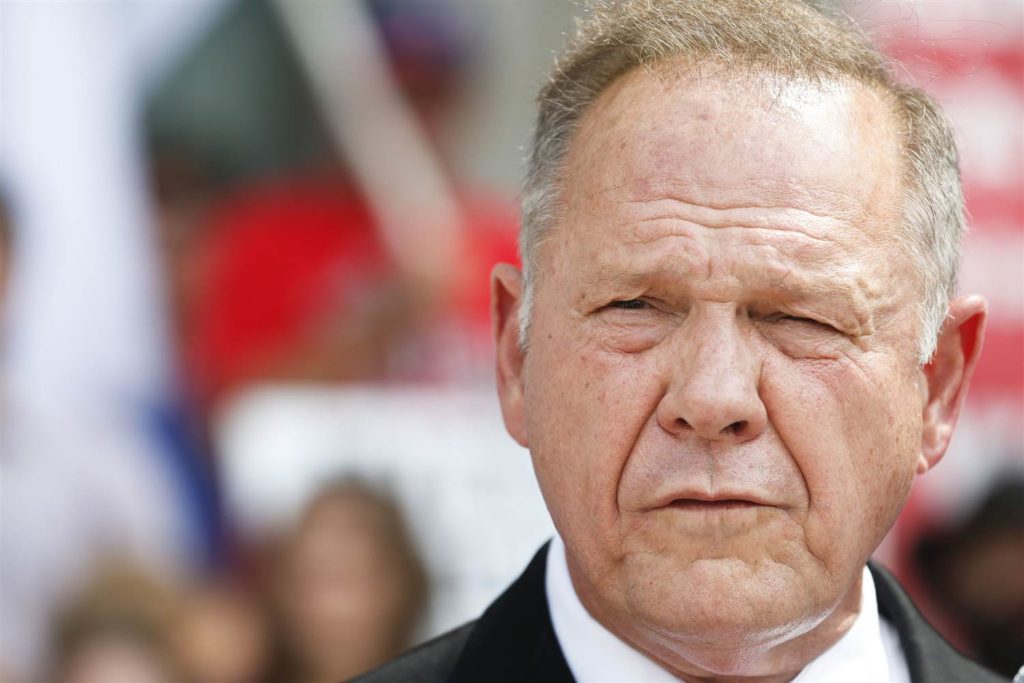
Alabama U.S. Senate candidate Roy Moore published an open-letter to Fox News host Sean Hannity Wednesday night pushing back against allegations of sexual misconduct from five women who claim he sexually pursued them when he was in his 30s and they were in their teens. The letter came less than 24 hours after Hannity issued an ultimatum, telling his viewers “the judge has 24 hours” to explain his “inconsistencies.” Read Moore’s full letter below: Dear Sean: I am suffering the same treatment other Republicans have had to endure. A month prior to the general election for U.S. Senate in Alabama, I have been attacked by the Washington Post and other liberal media in a desperate attempt to smear my character and defeat my campaign. Over the last 40 years I have held several public offices, including Deputy District Attorney, Circuit Judge, and Chief Justice of the Alabama Supreme Court. In addition to running five statewide and three county campaigns for public office, I have been involved in two major controversies that attracted national attention, one about the Ten Commandments and the other the sanctity of marriage. The Alabama Judicial Inquiry Commission, Court of the Judiciary, and Attorney General have investigated, scrutinized, examined, and vetted me, not to mention every opposing candidate against whom I have run. I have been married for almost 33 years to my wife Kayla. We have four children and five granddaughters. We are in the process of investigating these false allegations to determine their origin and motivation. For instance, we have documented that the most recent accuser, Beverly Nelson, was a party in a divorce action before me in Etowah County Circuit Court in 1999. No motion was made for me to recuse. In her accusations, Nelson did not mention that I was the judge assigned to her divorce case in 1999, a matter that apparently caused her no distress at a time that was 18 years closer to the alleged assault. Yet 18 years later, while talking before the cameras about the supposed assault, she seemingly could not contain her emotions. My signature on the order of dismissal in the divorce case was annotated with the letters “D.A.,” representing the initials of my court assistant. Curiously the supposed yearbook inscription is also followed by the same initials—”D.A.” But at that time I was Deputy District Attorney, not district attorney. Those initials as well as the date under the signature block and the printed name of the restaurant are written in a style inconsistent with the rest of the yearbook inscription. The “7’s” in “Christmas 1977” are in a noticeably different script than the “7’s” in the date “12-22-77.” I believe tampering has occurred. Are we at a stage in American politics in which false allegations can overcome a public record of 40 years, stampede the media and politicians to condemn an innocent man, and potentially impact the outcome of an election of national importance? When allegations of events occurring 40 years ago—and never before mentioned during a 40-year career of public service—are brought out and taken seriously only 30 days before a critical election, we may be in trouble as a country. I adamantly deny the allegations of Leigh Corfman and Beverly Nelson, did not date underage girls, and have taken steps to begin a civil action for defamation. Because of that, at the direction of counsel, I cannot comment further. – Roy S. Moore.
Fox News’ Sean Hannity gives Roy Moore ultimatum: Explain yourself or get out of the race
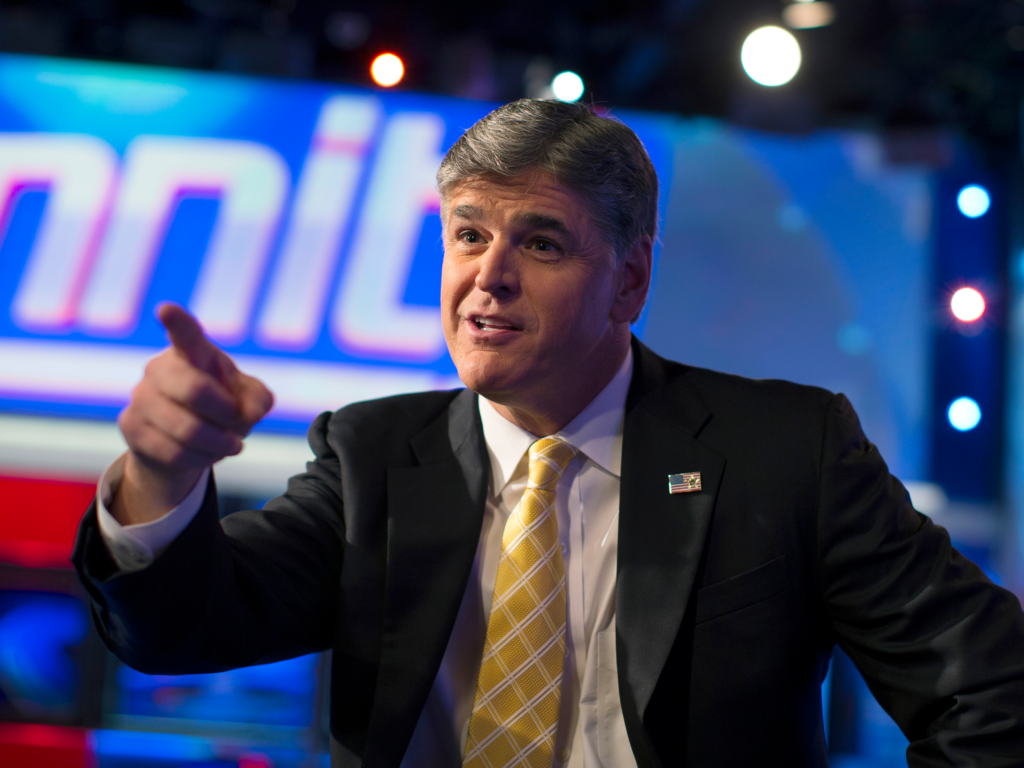
Once an ardent supporter of Alabama Senate nominee Roy Moore, Fox News’ Sean Hannity has stopped defending the embattled Republican. Late Tuesday night, Hannity told his viewers “the judge has 24 hours” to explain his “inconsistencies.” “You must immediately and fully come up with a satisfactory explanation for your inconsistencies,” Hannity demanded. “You must remove any doubt. If he can’t do this, then Judge Moore needs to get out of this race. You know I do not and will never rush to judgment, because we have seen the media and politicians get it wrong so many times.” Moore, who is running for Alabama’s U.S. Senate seat vacated by Attorney General Jeff Sessions, is fending off accusations from five women who allege he sexually pursued them when he was in his 30s and they were in their teens. The news has caused rapid fallout from dozens within the Republican Party who have called on him to withdraw his name from next month’s special election if the allegations are true. “The American people deserve a hundred percent truth and honesty,” Hannity added. “We need correct answers the first time on issues this serious. Judge Moore you owe that to the people of Alabama, the Republican Party that you represent and to the country which is suffering under so many problems. We deserve answers, consistent answers, and truth.” Moore has denied the sexual misconduct allegations. He faces Democrat Doug Jones in a special election on Dec. 12.
Mo Brooks hits back on Luther Strange’s ‘deceptive attacks’ in Senate primary

Mo Brooks is hitting back on the recent wave of “deceptive attacks” from opponents in the Alabama’s U.S. Senate race. Brooks’ new ad is the latest push on Sen. Luther Strange over who is the true Donald Trump supporter in the increasingly heated midsummer Alabama Senate primary to serve the rest of Attorney General Jeff Session’s term. The 30-second “Support Trump,” which launched Tuesday, reaffirms his “strong support” of Trump’s agenda, touting he voted with the president “95 percent of the time in Congress.” Strange — who has enjoyed support from the Senate Leadership Fund, linked to Majority Leader Mitch McConnell — has leveled waves of negative hits on Brooks, trying to paint the four-term Huntsville Republican congressman as a tepid (at best) Trump supporter and even a “closet liberal.” “There’s only one ‘Never Trumper’ in this race: Luther Strange,” said Brooks, a member of the House Freedom Caucus. “I supported President Trump in 2016 and wrote a $2,500 check to help him win. Luther never endorsed Trump, never donated and is now helping Mitch McConnell block the America First Agenda in the Senate.” “So, who are you going to believe: Mitch McConnell and Luther Strange?” he asks. With a “proven conservative” record, Brooks finishes his ad with a list of endorsements from leading “conservative thought leaders” such as Laura Ingraham, Sean Hannity, Mark Levin and Ann Coulter. Strange and Brooks are locked in a contentious primary battle, part of a nine-person GOP field that includes former Alabama Supreme Court Chief Justice Roy Moore. All three are running for a place in the race’s staunch conservative lane in a state that overwhelmingly supported Trump in 2016. Other Republican candidates in the race include Dr. James Beretta, Joseph Breault, Alabama Christian Coalition president Randy Brinson, Mary Maxwell, Bryan Peeples and state Sen. Trip Pittman of Baldwin County. As for who will ultimately represent Alabama, voters have less than two weeks to decide before the Aug. 15 Republican and Democratic primaries. The last day to apply for an absentee ballot is Aug. 10. If there is no primary winner — with 50 percent plus one — a runoff is Sept. 26; the general election is Dec. 12. “Support Trump” is now available on YouTube.
5 GOP Senate contenders appear at Vestavia Hills candidate forum
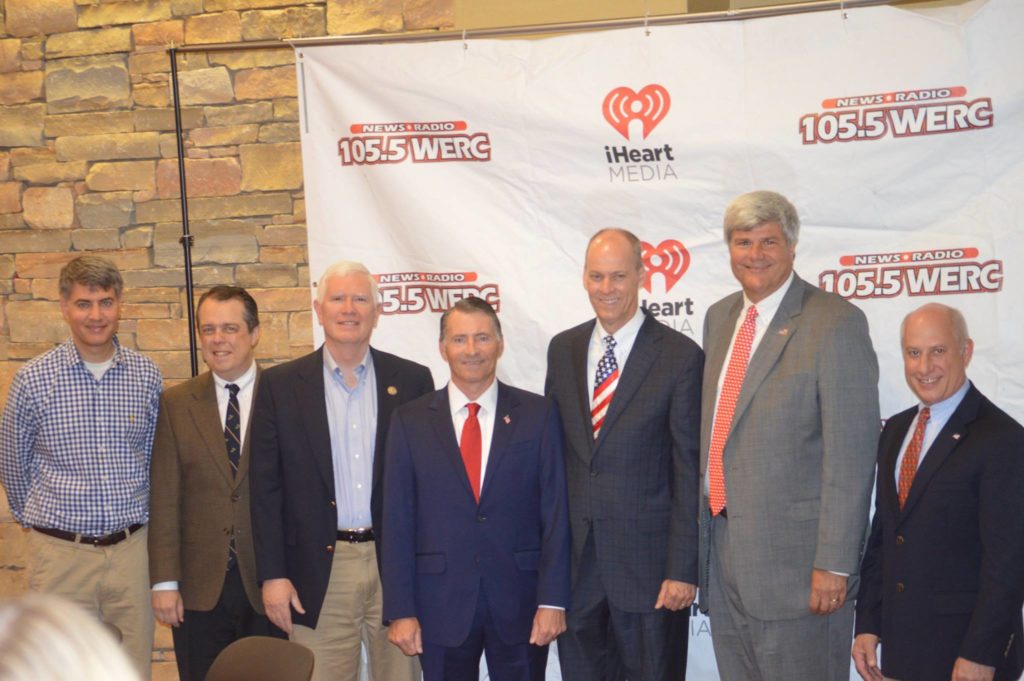
Five Republican Senate hopefuls appeared before the Mid-Alabama Republican Club for a meet-the-candidate event Saturday. As reported by AL.com, two of the leading candidates onstage — Congressman Mo Brooks and state Sen. Trip Pittman — took pains to point out their private sector experience in an attempt to distance themselves from the ‘career politician’ marker. “My primary source of income has always been in the private sector,” Brooks said, noting his law firm and time as general counsel for a distributor of roofing, siding, and windows, the largest in the nation. Brooks also referred to his ranking by conservative groups such as the anti-tax Club for Growth, Heritage Foundation and the immigration reduction group Numbers USA. “Every candidate talks the talk,” Brooks told the crowd. “It’s more important to walk the walk.” Brooks also pointed out a list of endorsements from conservative talk show hosts Sean Hannity, Mark Levin and Laura Ingraham, and his success in stopping the so-called Gang of Eight immigration reform effort in 2013. In an email this week, Brooks also received the endorsement of North Carolina Republican Rep. Mark Meadows, chair of the House Freedom Caucus. Pittman’s started his business in 1988, as well as standing for the state’s Gulf Coast in Montgomery. After a plane crash a decade ago, Pittman turned to public service. “It’s been a great challenge,” Pittman said. “But we have been successful in what we’ve been able to do in moving Alabama forward.” Pittman also discussed his time as chair of the Senate Budget Committee. “I understand the process. The process is important,” Pittman said, adding that whoever wins the Special Election to replace former Sen. Jeff Sessions should someone “willing to take staunch philosophical positions. “This is the best opportunity you have to elect someone with good ideology,” he said. Also at the forum were Hoover businessperson Dom Gentile, Alabama Christian Coalition head Randy Brinson, and Pelham physician James Beretta. Candidates who did not attend Saturday’s forum are scheduled to visit the Mid-Alabama Republican Club’s next meeting July 8.
Sean Hannity endorses Mo Brooks for Alabama U.S. Senate seat
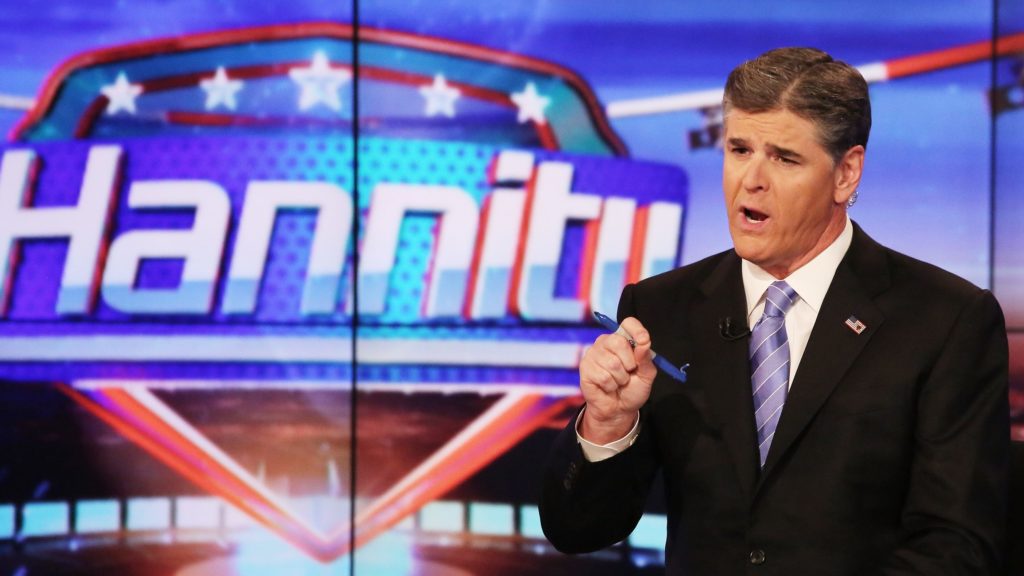
Fox News’ Sean Hannity tweeted his endorsement of Alabama 5th District U.S. Rep. Mo Brooks‘ Senate bid on Thursday. Hannity, an avid supporter of President Donald Trump, singled Brooks out from a crowded GOP field saying, “Mo Brooks will support Pres.Trump’s America 1st agenda, he is a proven conservative we need in the Senate. Support @RepMoBrooks 4 Senate.” Mo Brooks will support Pres.Trump’s America 1st agenda, he is a proven conservative we need in the Senate. Support @RepMoBrooks 4 Senate. — Sean Hannity (@seanhannity) June 8, 2017 Hannity is one of the most prominent and influential conservative voices in the country, hosting The Sean Hannity Show, a talk radio show that is syndicated to more than 500 stations and heard in all of the top 50 markets and has a loyal listenership of 13.5 million. Hannity also hosts a cable news show, Hannity, on Fox News Channel. Hannity’s endorsement follows the endorsements of other leading conservative thought leaders Brooks has picked up in recent weeks, including Laura Ingraham and Mark Levin. “With endorsements from leading national conservatives rolling in, my campaign is continuing to build momentum,” said Brooks. “Sean Hannity has carried the torch of conservatism for decades, and I’m proud to have his endorsement in this election.”
USAA says it will reinstate ads on ‘Hannity’

The USAA financial services firm is reinstating its advertising on Sean Hannity’s Fox News Channel program after receiving heavy criticism for its initial decision from many of the military members and veterans that it serves. The San Antonio, Texas-based company said Tuesday it will also start advertising again on other programs where it had suspended ads, including “Hardball” and “The Rachel Maddow Show” on MSNBC, and Jake Tapper’s “The Lead” on CNN. Following Hannity’s reporting on a discredited conspiracy theory involving the death of a Democratic National Committee staff member, the liberal advocacy group Media Matters last week posted a list of his show’s advertisers — and USAA was one of 10 to say it was pulling its commercials. At the time, the USAA said the company’s policy was to avoid politically opinionated shows. But many of USAA’s customers reacted angrily, and it didn’t help when the company’s advertising on other opinion shows was pointed out. USAA said it wasn’t trying to favor one set of political views over another. “We heard concerns from many members who watch and listen to these programs,” USAA said in a statement on Tuesday. “Our goal in advertising has always been to reach members of the military community who would benefit from USAA’s well-known commitment to service. Today, the lines between news and editorial are increasingly blurred.” The advertising is returning while the company reviews its policy about avoiding the opinion shows. Hannity was due to return to Fox Tuesday following a brief vacation. He had said he would no longer talk about the shooting death of Seth Rich last year following pleas from the man’s family, although his network had retracted an online story about Rich because it hadn’t met its reporting standards. Brent Bozell, president of the conservative Media Research Center, said he wasn’t surprised by USAA’s decision, “given the avalanche” of protests. His group was behind mobilizing that backlash, and said its members generated more than 1,600 phone calls to USAA within 48 hours. “They did the right think in going back on that show,” he said, “and so long as the other side isn’t participating in personal smears, they should participate on those shows, too.” Angelo Carusone, president of Media Matters, said the incident illustrates his belief that Hannity is volatile and dangerous for advertisers to be involved with. “Many are currently experiencing firsthand that doing business with Hannity means subjecting your brand to one potential PR crisis after another,” he said. Republished with permission of The Associated Press.

